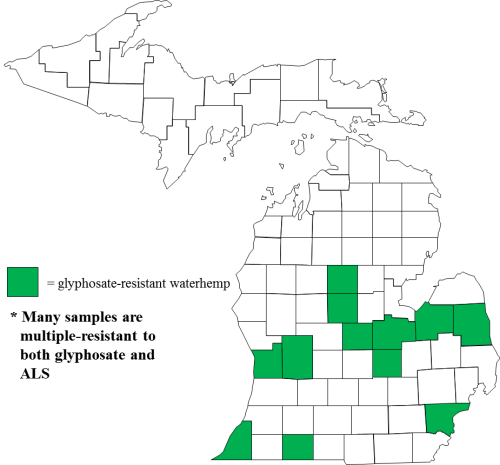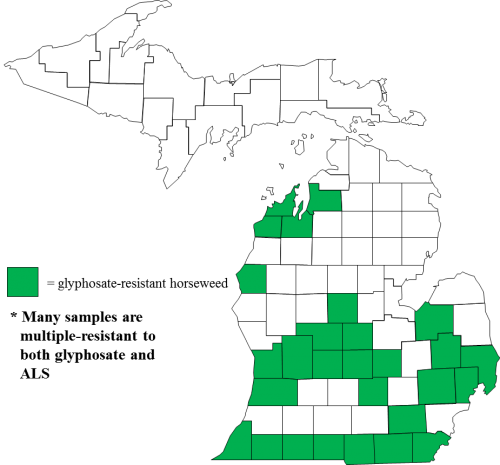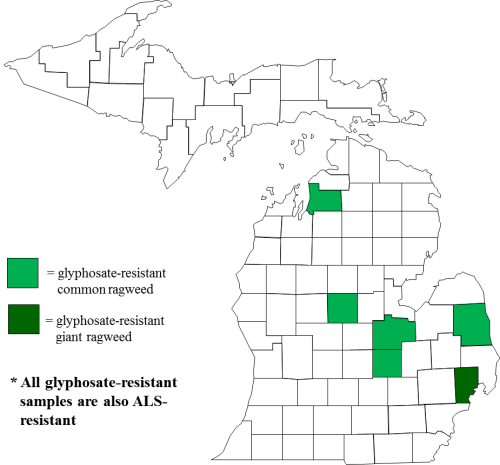2017 status of herbicide-resistant weeds in Michigan
Three new cases of resistant weeds were identified in 2017.
In 2016, yet another record number of plant samples were submitted to Michigan State University Diagnostic Services for herbicide resistance screening. Seventy samples were submitted in total, a 52 percent increase over 2015. The 2016 samples included two Palmer amaranth, three Powell amaranth, three redroot pigweed, 11common waterhemp, six common ragweed, three giant ragweed, five common lambsquarters, 36 horseweed/marestail and one eastern black nightshade.
Each sample received was tested for resistance to five or six herbicide sites of action. Fifty of the samples were sponsored by the Michigan Soybean Promotion Committee Weed Resistance Sampling Program. Non-sponsored samples came from field crop rotations without soybean, vegetable rotations, orchards or were species not covered by the Michigan Soybean Promotion Committee Program.
Though many of the screenings revealed that weeds previously known to be resistant in Michigan had spread to new counties, there were three new incidents of resistance.
- Common ragweed. Multiple resistance: PPO (Group 14)-resistant, Flexstar/Reflex (fomesafen) and ALS (Group 2)-resistant, and FirstRate (cloransulam). Locations: Huron and Saginaw counties.
- Giant ragweed. Glyphosate (Group 9)-resistant. Location: Macomb county.
- Eastern black nightshade. ALS (Group 2)-resistant, Raptor (imazamox) and Pursuit (imazethapyr). Location: Huron County.
Please view the full listing below for all of the new incidents and locations of resistance that were confirmed. A cumulative listing of confirmed herbicide resistant weeds by county was released in 2016 on the MSU Diagnostic Services website and has been updated to include these latest screenings.
We will be conducting herbicide resistance testing again in fall 2017. Please view “Tips for collecting weed seeds: Ensure your resistance sample gets tested” or “How to submit a sample to MSU Diagnostic Services” in the back of the “2017 Weed Control Guide for Field Crops” (MSU Extension bulletin E0434) for more information on submitting a sample.
The sample submission deadline is Nov. 10, 2017, to ensure enough time for our team to break seed dormancy and conduct the screenings. If you have any questions regarding sample submissions, please contact Erin Hill at hiller12@msu.edu for more information.
New county locations and incidents of resistance confirmed from 2016
G# refers to the herbicide site of action group.
- Multiple-resistant (glyphosate-G9/ALS-G2): Clare, Gratiot, Kent, Ottawa, Tuscola counties
- ALS-resistant (acetolactate synthase inhibitor, G2): Gratiot, Ingham, Tuscola counties
- ALS- resistant (G2): Benzie, Ottawa counties
- Multiple-resistant (glyphosate-G9/ALS-G2): Antrim County
- Multiple-resistant (ALS- G2/ PPO- G14): Huron, Saginaw counties
- ALS-resistant (G2): Eaton County
- Glyphosate-resistant (G9): Macomb County
- ALS-resistant (G2): Ottawa County
- Multiple-resistant (glyphosate-G9/ALS-G2): Allegan, Ingham, Kent, Tuscola counties
- Glyphosate- resistant (G9): Antrim, Benzie, Grand Traverse, Kent, Leelanau, Ottawa counties
- ALS-resistant (G2): Gratiot, Kent counties
- ALS-resistant (G2): Huron County
Maps of glyphosate- and multiple-resistant weeds in Michigan

Palmer amaranth (distribution in Michigan). Most samples are confirmed multiple-resistant to both glyphosate and ALS, Barry county has three-way resistance to glyphosate, ALS and atrazine.

Common waterhemp (glyphosate-resistant). Many samples are multiple-resistant to both glyphosate and ALS.

Horsetail/marestail (glyphosate-resistant). Many samples are multiple-resistant to both glyphosate and ALS.

Common and giant ragweed (glyphosate-resistant). All glyphosate-resistant samples are also ALS-resistant.



 Print
Print Email
Email

